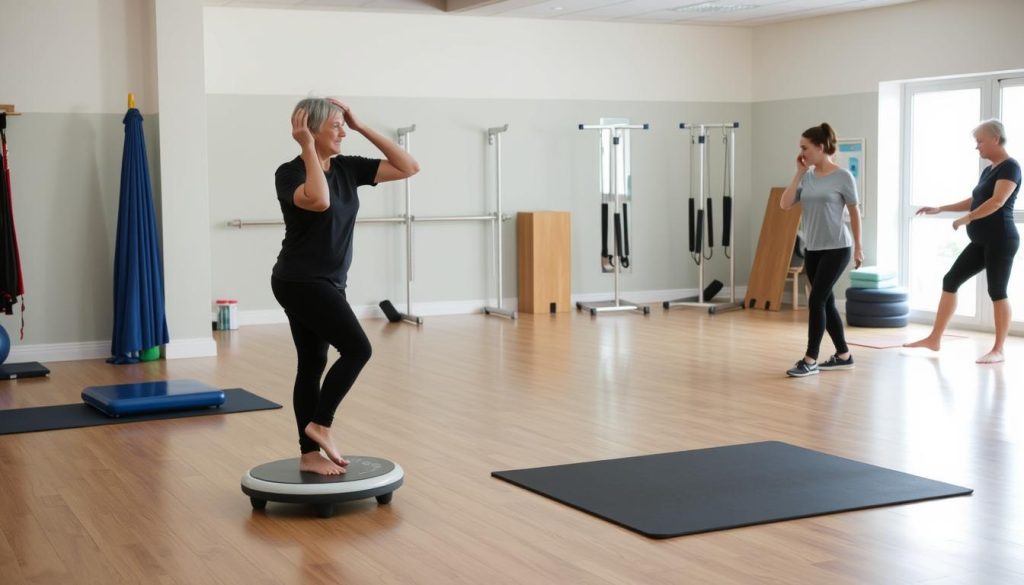Vertigo symptoms can make your world spin. It’s more than just feeling a bit dizzy. Imagine standing still but feeling like you’re spinning. That’s what vertigo feels like.
So, what are vertigo symptoms? They make you feel like you’re moving when you’re not. You might feel like you’re tilting or losing your balance. These feelings can be mild or very strong, lasting from seconds to days.
There are many reasons for vertigo. Inner ear problems are common. But sometimes, it’s linked to serious health issues. Knowing the signs is key to knowing when to get help. Let’s explore this confusing condition further.
What Is Vertigo Symptoms and Their Common Manifestations
Vertigo symptoms can be unsettling and disrupt daily life. The main sign is a spinning sensation. But, vertigo symptoms causes vary. Understanding what is vertigo symptoms helps in identifying and managing this condition.
Identifying Episodes of Dizziness and Spinning Sensations
The hallmark of vertigo is feeling like you or your surroundings are spinning. This can happen even when you’re standing still. Some people describe it as a tilting or swaying feeling.
These sensations can make simple tasks challenging. They also increase the risk of falls.
Duration and Intensity of Vertigo Attacks
Vertigo episodes can last from a few seconds to several hours. The intensity varies too. Mild cases might cause slight unsteadiness, while severe attacks can be debilitating.
Some people experience vertigo symptoms intermittently, while others have constant dizziness.
Associated Physical Symptoms During Episodes
Vertigo often comes with other physical symptoms:
- Nausea and vomiting
- Headache
- Sweating
- Ringing in the ears (tinnitus)
- Difficulty focusing or moving the eyes
These symptoms can vary based on the underlying cause of vertigo. Recognizing these signs helps in seeking timely medical attention. It also helps in finding effective treatment options.
Common Triggers and Causes of Vertigo Episodes
Vertigo symptoms can come from many sources, like inner ear problems or certain medicines. Knowing what causes vertigo is key to managing it well.
Inner ear issues are a big reason for vertigo. The vestibular system, which helps us balance, can get messed up. This might happen because of infections, fluid buildup, or tiny crystals getting out of place. When this happens, the brain has trouble figuring out where we are in space, causing vertigo.
Head injuries can also cause vertigo. Damage to the inner ear or problems with how the brain handles balance can happen. Sometimes, vertigo starts right after an injury. Other times, it might show up later.
Some medicines can make vertigo worse. These include:
- Antidepressants
- Blood pressure medications
- Anti-seizure drugs
- Antibiotics
Some health issues can lead to long-term vertigo. Meniere’s disease, which causes fluid buildup in the inner ear, is one. Vestibular migraines, which affect balance, can also cause vertigo to come back often.
| Vertigo Cause | Common Symptoms | Duration |
|---|---|---|
| BPPV | Spinning sensation, nausea | Seconds to minutes |
| Vestibular Neuritis | Severe dizziness, balance problems | Days to weeks |
| Meniere’s Disease | Vertigo, hearing loss, tinnitus | 20 minutes to several hours |
| Vestibular Migraine | Vertigo, headache, light sensitivity | Minutes to hours |
Finding out what causes your vertigo is important for getting the right treatment. If vertigo keeps happening, see a doctor. They can find out why and help you manage it.
Types of Vertigo: Peripheral vs. Central Causes
Vertigo can be divided into two main types: peripheral and central. Peripheral vertigo comes from problems in the inner ear. Central vertigo, on the other hand, is linked to the brain or nervous system. Knowing the difference is key for accurate diagnosis and treatment.
BPPV (Benign Paroxysmal Positional Vertigo)
BPPV is the most common peripheral vertigo. It happens when tiny calcium crystals in the inner ear move out of place. This leads to brief, spinning feelings triggered by head movements. Symptoms include sudden, short-lived dizziness.
Vestibular Neuritis and Labyrinthitis
These conditions involve inflammation of the inner ear or vestibular nerve. Symptoms can be severe and last a long time, often with nausea and balance issues. Viral infections are the main cause.
Meniere’s Disease and Related Conditions
Meniere’s disease causes recurring vertigo, hearing loss, and tinnitus. It’s thought to be due to fluid buildup in the inner ear. Diagnosing Meniere’s involves looking at these symptoms and running specific tests.
| Condition | Main Symptoms | Duration | Typical Causes |
|---|---|---|---|
| BPPV | Brief spinning sensation | Seconds to minutes | Displaced ear crystals |
| Vestibular Neuritis | Severe dizziness, nausea | Days to weeks | Viral infection |
| Meniere’s Disease | Vertigo, hearing loss, tinnitus | 20 minutes to hours | Inner ear fluid imbalance |
Warning Signs That Require Immediate Medical Attention
It’s important to know when vertigo symptoms are serious. While most vertigo is not dangerous, some signs need quick medical help. Knowing these signs can help you figure out if you need urgent care or not.
Emergency Symptoms Associated with Vertigo
Some vertigo symptoms are a big deal and need immediate attention. These include sudden, severe headaches, vision changes, or trouble speaking. Also, if you’re vomiting a lot, have chest pain, or feel numbness in your limbs, get help fast.
When to Visit the Emergency Room
There are times when you should go straight to the ER for vertigo. This includes vertigo with loss of consciousness, seizures, or severe neck pain. Also, if vertigo happens after a head injury or with a high fever, you need to see a doctor right away.
Red Flags for Underlying Conditions
Some vertigo symptoms might mean there’s something serious going on. If you’re losing weight without trying, hearing changes, or having trouble balancing, it could be more than just vertigo. If you’re having vertigo with symptoms like confusion or weakness, you should get checked out by a doctor.
| Warning Sign | Possible Underlying Condition | Action Required |
|---|---|---|
| Sudden, severe headache | Stroke or brain hemorrhage | Immediate ER visit |
| Vision changes with vertigo | Retinal detachment or ocular stroke | Urgent ophthalmological exam |
| Vertigo after head injury | Concussion or brain trauma | Immediate medical evaluation |
| Persistent balance problems | Neurological disorders | Neurologist consultation |
Remember, acting fast when you see these warning signs can save your life. If you’re unsure about your vertigo symptoms, always get professional advice.
Diagnostic Approaches for Vertigo Assessment
Getting a correct vertigo diagnosis is key to treating it well. Doctors use different methods to find out what causes vertigo and what symptoms it brings. Let’s look at the tools used to solve this tricky condition.
Physical exams are the first step in diagnosing vertigo. Doctors check how well you move your eyes, balance, and coordinate. They might do the Dix-Hallpike test, which involves quick head movements to see if vertigo happens.
Balance tests are also important. These include:
- Romberg test: Standing with eyes closed
- Fukuda-Unterberger test: Marching in place with eyes closed
- Posturography: Using a force plate to measure body sway
Imaging studies help find what might be causing vertigo. MRI scans look for brain problems, while CT scans check the inner ear. These tests help find serious issues like tumors or strokes.
| Diagnostic Method | Purpose | Vertigo Type Detected |
|---|---|---|
| Electronystagmography (ENG) | Measures eye movements | Peripheral vertigo |
| Videonystagmography (VNG) | Records eye movements with video | Central and peripheral vertigo |
| Rotary chair testing | Assesses vestibular function | Bilateral vestibular loss |
Blood tests might be done to check for infections or autoimmune diseases. Audiometry tests also check for hearing loss linked to vertigo. These detailed methods help find the right diagnosis and treatment.
Treatment Options and Medical Interventions
Vertigo treatment aims to tackle symptoms and their causes. Doctors use different methods to help patients feel better. Let’s look at the main ways to treat vertigo.
Medication-Based Treatments
Doctors often give medications to manage vertigo. These can include antihistamines, anticholinergics, or benzodiazepines. Some drugs help with dizziness and nausea. Others target conditions like Meniere’s disease.
It’s important to follow your doctor’s advice when taking these medications.

Surgical Options for Severe Cases
In rare cases, surgery might be needed for vertigo treatment. This is usually when other treatments don’t work or for specific conditions like acoustic neuroma. Surgical options include:
- Labyrinthectomy
- Vestibular nerve section
- Endolymphatic sac decompression
These surgeries aim to fix inner ear problems or reduce nerve pressure causing vertigo.
Alternative Therapeutic Approaches
Many people find relief through alternative therapies. These can be used alongside traditional treatments:
- Acupuncture
- Herbal supplements
- Tai Chi
- Ginger tea
While some people report benefits, it’s key to talk to your doctor before trying these for vertigo relief.
Remember, the right treatment plan depends on your symptoms and cause. Work with your healthcare provider to find the best approach for you.
Self-Help Techniques and Home Remedies
Vertigo can be tough to handle, but there are ways to feel better. You can try self-help techniques and home remedies to manage your symptoms. These methods can help you live a better life.
The Epley maneuver is a great way to manage vertigo. It involves moving your head in specific ways. This can help move crystals in your inner ear and ease dizziness.
- Sit on a bed with your head turned 45 degrees to the affected side
- Quickly lie back with your head hanging off the edge of the bed
- Wait for 30 seconds, then turn your head 90 degrees to the opposite side
- Wait another 30 seconds, then roll onto your side
- Slowly sit up and wait a few minutes before standing
Ginger tea is a natural way to fight nausea from vertigo. Drinking it can help ease your symptoms.
Doing balance exercises can make you feel more stable. Try standing on one foot or walking heel-to-toe. These activities can help improve your balance.
| Vertigo Exercise | Frequency | Benefits |
|---|---|---|
| Epley Maneuver | 3 times daily | Repositions inner ear crystals |
| Balance Training | 15 minutes daily | Improves stability |
| Gaze Stabilization | 2-3 times daily | Reduces dizziness |
Always talk to a doctor before trying new exercises or techniques. They can make sure they’re right for you.
Lifestyle Modifications to Manage Vertigo
Making changes to your daily routine can greatly improve vertigo management. By tweaking your diet, sleep habits, and stress levels, you can find significant vertigo relief.
Dietary Changes and Restrictions
What you eat can affect vertigo symptoms. Limiting salt intake helps reduce fluid buildup in the inner ear. Cutting back on caffeine and alcohol may also provide vertigo relief. Some people find that avoiding trigger foods like chocolate or aged cheese helps manage their symptoms.
Sleep Position Adjustments
Your sleeping position can impact vertigo episodes. Elevating your head slightly with an extra pillow might help. For those with BPPV, sleeping on your back or the unaffected side can reduce vertigo symptoms.
Stress Management Techniques
Stress can worsen vertigo, making effective stress management crucial for vertigo treatment. Try these techniques:
- Deep breathing exercises
- Meditation or mindfulness practices
- Regular physical activity
- Engaging in hobbies or relaxing activities
By incorporating these lifestyle changes, you can take control of your vertigo symptoms and improve your quality of life. Remember, consistency is key in vertigo management.
Vestibular Rehabilitation Exercises and Their Benefits
Vestibular rehabilitation exercises are key in treating vertigo. They help the brain and improve balance. This is a gentle way to manage vertigo symptoms.

These exercises include head movements, eye training, and balance activities. They stimulate the vestibular system. This helps the brain adjust to any issues. Vestibular rehabilitation can greatly reduce dizziness. It also improves life quality for those with vertigo.
Some common vertigo exercises are:
- Gaze stabilization exercises
- Balance training on different surfaces
- Head movement exercises
- Walking with head turns
Do these exercises regularly, for 6-12 weeks, to see better results. Start slow and get harder as you get better. Always talk to a healthcare professional before starting any new exercise.
Vestibular rehabilitation does more than just help with vertigo. It also improves balance and reduces fall risks. People feel more confident in their daily lives. This treatment is especially good for BPPV and vestibular neuritis.
“Vestibular exercises have given me my life back. I can now enjoy activities I thought were lost to me forever.”
Vestibular rehabilitation is a strong tool for vertigo treatment. But, it works best with other strategies. A complete approach includes diet changes, stress reduction, and sometimes medical help. This offers the best relief from vertigo.
Prevention Strategies and Long-Term Management
Living with vertigo can be tough, but there are ways to make it easier. By using good prevention and management, you can feel better. This means fewer and less severe vertigo episodes.
Keeping your inner ear healthy is very important. Regular exercise, especially for balance, can help a lot. Try these exercises every day:
- Tai chi
- Yoga
- Balance board exercises
- Gaze stabilization exercises
It’s also important to know and avoid things that make vertigo worse. Keep a journal to track things like:
- Certain head movements
- Specific foods or drinks
- Stress or anxiety
- Changes in sleep patterns
Once you know what triggers your vertigo, try to avoid them. This might mean changing your diet, finding ways to relax, or improving your sleep.
Regular visits to your doctor are also crucial. They can check on your progress, change treatments if needed, and help you stay on track.
“Prevention is better than cure. By taking proactive steps to manage vertigo, you can significantly reduce its impact on your daily life.”
Remember, being consistent is key. Stick to your plan, stay active, and ask for help when you need it. With the right approach, you can manage vertigo and live a happy life.
Living with Vertigo: Coping Strategies and Support Resources
Living with vertigo can be tough, but there are ways to handle it. You might need to change your daily routine to deal with dizzy spells. Keeping a vertigo diary can help you find what triggers your vertigo and see if treatments work.
Support groups are a great place to share your story and learn from others. They offer emotional support and tips for managing vertigo. You can find online forums and local groups to connect with others. Health organizations also provide valuable information to help you understand and manage your condition.
It’s important to stay independent with vertigo. Making simple changes at home, like installing handrails, can make a big difference. Staying informed about health conditions that might affect your vertigo is also key. Regular doctor visits and following treatment plans are crucial for managing vertigo. With the right approach and support, you can still have a fulfilling life despite vertigo.
FAQ
Q: What are the main symptoms of vertigo?
A: Vertigo makes you feel like you’re spinning. You might feel dizzy, lose your balance, and get nauseous. Some people also sweat, get headaches, or feel like their ears are full.
Q: How long do vertigo episodes typically last?
A: Vertigo episodes can last from seconds to days. BPPV episodes are usually quick, under a minute. Meniere’s disease attacks can last hours.
Q: What are common causes of vertigo?
A: Inner ear problems like BPPV and Meniere’s disease cause vertigo. Head injuries, migraines, and some meds can also trigger it. Rarely, brain issues like tumors or strokes can cause it too.
Q: How is vertigo diagnosed?
A: Doctors use your medical history, physical exam, and tests to diagnose vertigo. They might do the Dix-Hallpike maneuver, ENG, or MRI scans.
Q: What are the treatment options for vertigo?
A: Treatment depends on the cause. It might include meds, exercises, or the Epley maneuver for BPPV. Surgery is rare. Lifestyle changes and home remedies can also help.
Q: Are there any effective home remedies for vertigo relief?
A: Yes, home remedies like the Epley maneuver and Brandt-Daroff exercises can help. Staying hydrated and avoiding sudden head movements also helps. Ginger can fight nausea. Always talk to a doctor before trying new treatments.
Q: When should I seek immediate medical attention for vertigo?
A: Get help right away if you have severe headache, chest pain, trouble breathing, vision changes, speech issues, weakness, or loss of consciousness. These signs could mean something serious.
Q: Can vertigo be prevented?
A: You can’t prevent all vertigo, but you can lower your risk. Keep your inner ear healthy, stay hydrated, manage stress, avoid triggers, and do balance exercises.
Q: What lifestyle changes can help manage vertigo?
A: To manage vertigo, reduce salt intake, limit alcohol and caffeine, quit smoking, and manage stress. Good sleep hygiene is also important.
Q: Are there support resources available for people living with chronic vertigo?
A: Yes, there are many resources for chronic vertigo. You can find support groups, online forums, educational materials, and counseling services. They help with the emotional side of the condition.


















